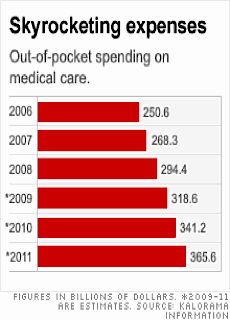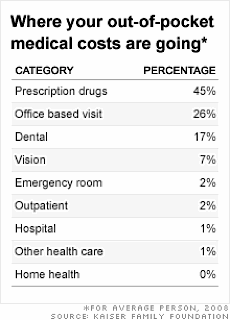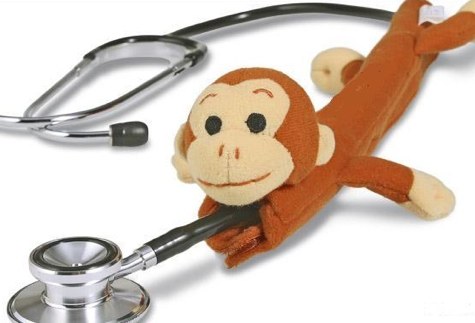What can we do to lower our health care costs? Our guest writer, Jacques Sprenger, tells us how he manages and pays off his medical bills.
I had the unfortunate experience of having my medical bills accumulate last year due to my spouse’s accident (broken leg), which triggered costs for rehab. On top of this, I had special lab studies I needed to have done for myself and non-standard annual procedures that were required for those of us getting on in years. Even with insurance coverage, the total exceeded $5,000, a considerable sum for a humble teacher. I learned however how to navigate these dangerous financial debts without getting into FICO trouble.
From this CNN Money article, we can gather this: “Americans spend an estimated $294 billion on annual out-of-pocket medical costs annually, to cover everything from doctor’s office co-payments to surgeries and prescription medications,” which tells me that I am not alone in the struggle to cope with our extremely deficient and unfair health care system.

|

|
“About 25% of that — around $74 billion — is already being charged to regular standard credit cards,” a very dangerous trend that tells me that many Americans simply don’t have the cash to deal with such immense debt. Since we simply cannot ignore our health needs and problems, what can one do when faced with medical debts? Some tips I’ve applied myself:
How I Manage My Medical Bills and Avoid Medical Debts
1. Negotiate with your health care provider.
My spouse’s hospital bill, after insurance, amounted to approximately $950. I therefore went to the hospital’s billing department and negotiated a lower payment (20% less) in exchange for a cash payment. Even if you can’t settle immediately, negotiate a time frame to give you some leeway to come up with the money. Give your creditor 10% and tell them that you will settle the rest in 30 days. This will give you the opportunity to find help from relatives or from your place of employment (for more options, see our article on how to get a personal loan). Make sure that your provider agrees to keep the discount open for the time frame; hospitals are in business to make money and since so many of their patients are unable to pay, they welcome those who are able to come up with cash in a short time.
2. Review your medical bills carefully; there could be errors!
Check the medical bills very carefully, item by item. Why? Because apparently, 80% of hospital bills are wrong! According to eHow (and yes, I agree with them that this is an unbelievable statistic), hospital bills are full of errors — from overcharges for items used or unused but billed for, to charges for services that never took place, mistakes do abound! Dispute any and every item you think is wrong. This could save you a lot of money.
3. Avoid taking on bad debt.
So what do I mean by bad debt? Do not under any circumstance obtain a loan from pay day or cash advance places. You will be skimmed alive with monstrous interest rates if you are just a few days late.

4. Be careful about using your credit card.
Use your credit card to pay your bills only if you have no other choice or if you can pay your card balance in full. For those who have trouble with credit card debt, this must be a last resort, not the first one.
5. Arrange a payment schedule if necessary.
For the once a year procedure, my spouse’s bill amounted to $800. Since we were short of cash (after paying the hospital), I negotiated a $30 monthly payment without interest. We just finished paying last month. DO NOT be afraid to talk to your medical creditors. Most of them are willing to accommodate you and help you establish a payment schedule if they see a genuine intention to pay off the debt.
6. Understand your costs before receiving any service.
If you have a chance to talk about costs before any medical service — that includes visits to your regular doctor — ask what the co-pay will be if you have insurance, or if you don’t have coverage, ask what the alternatives are. You may actually qualify for Medicaid; it’s also possible that your doctor may be willing to lower his fees. If you don’t ask, you don’t know. DO NOT be ashamed to bargain; it can save you hundreds of dollars.
7. Beware of so-called Help for Medical Bills.
Many companies offer to lower your medical bills and payments. Yeah, right! Don’t fall for this: their exorbitant fees are only going to add to your debt load. If you have a difficult financial situation due to medical bills or any other cause, there are other reliable financial consultants you can turn to. Check with the Better Business Bureau to find out who’s reputable and to see who has complaints lodged against them; do ask around till you find the right one.
8. Get expensive medical procedures done elsewhere.
Finally, my usual recommendation: if you can, go to Mexico, India or another country for any elective surgical procedure. You may be surprised to learn that many countries can offer you top medical care and services at much, much lower prices, and medication is 10% of what it costs here (here’s more on where to find cheap prescriptions). I know someone who was able to receive surgery at a quarter of the price by getting it abroad. The surgery cost $100,000 even after insurance was applied in the U.S., but only $25,000 in Asia.
Any other suggestions for coping with medical bills and health care costs?
Copyright © 2009 The Digerati Life. All Rights Reserved.

{ 9 comments… read them below or add one }
Don’t forget to use a flexible spending account if you have one available to you. An FSA allows you to have money taken out of your paycheck each month – pre-tax. You can only spend the money on IRS approved medical expenses (prescriptions, co-pays, glasses, contacts, and some over-the-counter medical items are some of my favorites, but there are many more) but you don’t pay taxes on that money. Depending on your tax bracket you could easily reduce you medical expenses by 15% to 20%.
My piece of advice is to double check that the hospital or medical facility billing department has your correct mailing address and phone number. Last year I had a trip to the ER in which I gave them all the updated information when I seen and evaluated. I watched them put it into their computer system in front of me.
Every January I run a credit report check and found a collections notice on my credit report!! After some digging, it turns out that the billing department had my old address and phone number from 5 years ago and couldn’t contact me to settle the $200 out of pocket payment for the ER! So, they sent it to collections and even though I settled it the same day I pulled the report – and received a letter from collection’s agency saying it was paid in full – it is showing a big red mark on my credit report and my credit score dropped like a rock. All because they hospital messed up on my contact information.
From this point on I will be calling any medical facilities a after any medical procedures to verify that they have their t’s crossed and i’s dotted so this NEVER happens again.
We are trying to not let it get that way. My wife was diagnosed with Achalasia and just the testing alone cost a few thousand dollars which insurance was supposed to cover but in the end they rejected the claims and are not going to cover any future costs (for the next three years) related to her condition. We are working towards paying off what we owe and also looking around for ways of covering costs for surgery she needs to get in the very near future.
I had a baby two months ago and I think I finally have all the bills taken care of. I’ll admit I did not check the bill for my hospital stay very carefully. It seemed to be correct, but really the thing was so vague that how could I ever know if there was an error? There was nothing obviously wrong and it was very similar to the bill from my other son’s birth two years prior, so I assumed it was good.
I too have had the experience where a billing office had a wrong address for me. Somehow the bill from the collections agency did make it to me and it was easily and quickly resolved.
I’m glad that this has not happen to me. My baby was hospitalized last week and hopefully I have paid the bills in full and of course my health insurance has helped too.
“Every January I run a credit report check and found a collections notice on my credit report!! After some digging, it turns out that the billing department had my old address and phone number from 5 years ago and couldn’t contact me to settle the $200 out of pocket payment ”
I had a similar thing happen. $50 dollar bill in college almost derailed my plans to purchase my first house. They were sending the bill to an old address.
I have also been able to negotiate substantial discounts for cash payment. A couple of other suggestions:
If you have a high deductible plan, make sure you understand how it works. To my surprise and delight, I found out recently that my insurance plan carries over the amount of the deductible incurred in the last couple of months to the next year, so the fact that I ran through my deductible through various procedures last December meant that my deductible for this year had been fully met before the year even started. Which leads to –
Schedule covered elective procedures and screenings for years in which you have already met your deductible. If you’re due for your first colonoscopy (and who over 50 isn’t?), get it in the year you also get the knee surgery you’ve been putting off, or whatever.
With all the political wrangling about health care right now, I thought you and your readers might be interested in this factoid: According to the Consumer Expenditure Survey, we spend the same proportion of our consumer spending on health care as we do on “meals away from home.” Curious how the same amount of money can represent a huge crisis in one context and a big yawn in another.
Great advice. With how inflated health care prices have become lately, every bit of knowledge to combat it helps.
Unfortunately it’s true, everything gets more expensive. But think about it, it’s our life, our health. Some medical operations should really be more accessible. There is the insurance that helps us a bit…